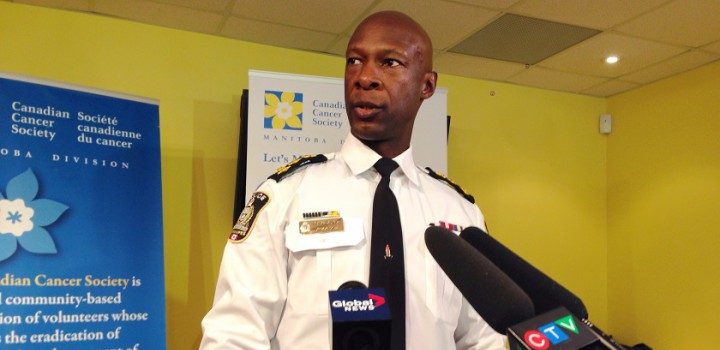Law enforcement experts say it’s time for an examination of policing in the city — among them a former Winnipeg police chief.
Devon Clunis, who served as the city’s top cop from 2012 to 2016, told 680 CJOB that Winnipeg needs an honest and robust conversation about the expectations of the police service.
Winnipeg’s 911 communications centre averages more than 2,000 calls for service every day. The top two call types, police say, are for well-being checks and domestic violence.
While emergency calls for crimes like shootings and stabbings get answered quickly with sirens, other issues can wait hours or even days for a response — something Clunis said shouldn’t happen.
“A lot of these calls should never end up in the queue,” he said.
“But the fact that they do … they sit there just in case, and we have to have honest conversations about what is a police officer’s responsibility … and should there be somebody else to take care of that?
“We don’t have enough resources in the community to deal with some of those issues, and the police become this catch-all.”
Then-Winnipeg police chief Devon Clunis speaks during a news conference in this 2015 file photo.
Global News / File
Clunis said advances in technology have affected relationships between police and community members, and not always for the better.
While the victim of a break-in can be directed to fill out a report online and get an incident number for insurance purposes, Clunis feels that too much reliance on tech creates a disconnect between the average Winnipegger and the police service. Rebuilding that connection, he said, is important going forward.
“I do remember being that officer who would go to a (break and enter) and spending the time consoling someone, when they’re just feeling so good that you were there. I think that’s what I would like if my home got broken into.
“Yes, we’re trying to do the best we can with technology, because we have so many calls and we’re trying to provide the best service we can … but it’s actually leading to a greater sense of disconnect,” he said.
“When you’ve been violated, there’s nothing better than seeing a police officer there providing care, or dealing with the crime, or whatever that might be. We think technology is going to fix all these issues…. Nothing replaces that human connection, and that’s what we’re missing.”
A University of Winnipeg prof says it’s time to trust other agencies to handle wellness checks in the city — and that Winnipeg’s current search for a new police chief is perfect timing to examine some of the issues.
Kelly Gorkoff, chair of the U of W’s criminal justice department, said many of the well-being calls include a mental health component, so health-care workers — not police — should take the lead.
“If you’re not checking on someone for 14, 15 hours, the time has passed,” Gorkoff said.
“Police can’t do everything alone, and it’s a pivotal moment, I think, to — maybe not radically, but systemically — rethink the role of policing in society.”
That opinion, Gorkoff said, isn’t an affront to police, but rather taking advantage of an opportunity to better allocate resources citywide.
“I think that the leadership in policing has carried on that pattern of putting everything on the shoulders of police officers, and it’s not fair. We see there’s a high rate of attrition in policing, it’s very difficult to recruit police,” she said.
“This is the moment we need leadership at the civic level and at the policing level to give away some of that power to groups who are trained to respond to things like wellness checks or even homeless encampments or protests. ”
Last week, Grand Chief Jerry Daniels of the Southern Chiefs’ Organization called for a wholesale culture change if the police service — under new leadership — and the city want to embrace reconciliation.
Daniels said a staggering 70 per cent of respondents to a recent survey taken by First Nations in southern Manitoba said they had had first-hand experience with racism in policing. A further 66 per cent said they have avoided seeking help from police for that reason.


